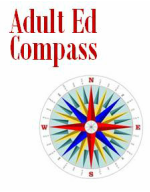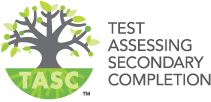TASC Replacing the GED® Test in New York State
Due to the dramatic nature of the changes to the new 2014 GED® test, New York State has elected to replace the GED® test with the Test Assessing Secondary Completion (TASC) from CTB/McGraw Hill.
People who pass the TASC will receive a New York State High School Equivalency (HSE) Diploma just as they did when they passed the GED® test before now.
The new 2014 GED® test is computer-based, Common Cored-aligned, and expensive. Due to these dramatic changes, New York State has elected to replace the GED® test with the Test Assessing Secondary Completion (TASC) from CTB/McGraw Hill. The TASC is offered in two formats: a paper based test and computer based test. It is Common Cored-aligned but the degree of difficulty will slowly increase over three years. The TASC is less expensive than the new 2014 GED® so New York State can afford to offer more at no cost to the test taker.
New York State plan for implementing the TASC:
Paper-based or Computer-based?
Test administration?
What about the content?
Who pays for the TASC In New York State?
What pathways to a High School Equivalency Diploma exist in NYS?
While it was common for GED test passers to say, “I got my GED” in the past, this was actually never the case. Before 2014, test takers passed the GED to “get” or be granted a High School Equivalency Diploma (HSED). Now they need to pass the TASC in order to be granted a HSED. While passing the GED was historically the most popular route to a HSED before 2014, NYS has and continues to provide three pathways to a High School Equivalency Diploma (HSED):
1. Pass the TASC assessment
2. Successfully complete 24 college credits
3. Successfully complete the National External Diploma Program (NEDP)
- Test centers may offer only paper-based tests, only computer based tests, or offer both but any candidate will be offered the test in the format they require.
- Computer-Based Tests use the TABE Online platform.
Test administration?
- NYS testing centers remain the same.
- Development, printing, scoring, and transfer of TASC scores to the New York State Education Department (SED) is all be taken care of by CTB/McGraw Hill. CTB/McGraw Hill is also responsible for secure shipping and downloading of test materials to the existing 269 SED approved testing centers.
- CTB/McGraw Hill also manages the testing accommodations process.
What about the content?
- All content is aligned to the K-12 Common Core State Standards, the Office of Vocational and Adult Education’s College and Career Readiness Standards for Adult Education, the K-12 Next Generation Science Standards, and national K-12 standards for Social Studies. The TASC is expected to be fully aligned to the Common Core by 2017.
- The test is composed of five subtest sections: 1) English Language Arts Reading, 2) English Language Arts Writing, 3) Mathematics, 4) Science, and 5) Social Studies.
- Text complexity will increase in 2015 and again in 2016.
- TASC is available in English and Spanish. The TASC is not available in French.
- Braille, large print and audio versions for the visually impaired are also available.
Who pays for the TASC In New York State?
- There is a law in New York State that requires that the test taker not be charged to take HSE exams. Therefore, the TASC is free to test takers; the cost is paid for by the New York State Education Department.
- Test Takers are allowed two free retakes per calendar year.
What pathways to a High School Equivalency Diploma exist in NYS?
While it was common for GED test passers to say, “I got my GED” in the past, this was actually never the case. Before 2014, test takers passed the GED to “get” or be granted a High School Equivalency Diploma (HSED). Now they need to pass the TASC in order to be granted a HSED. While passing the GED was historically the most popular route to a HSED before 2014, NYS has and continues to provide three pathways to a High School Equivalency Diploma (HSED):
1. Pass the TASC assessment
2. Successfully complete 24 college credits
3. Successfully complete the National External Diploma Program (NEDP)


